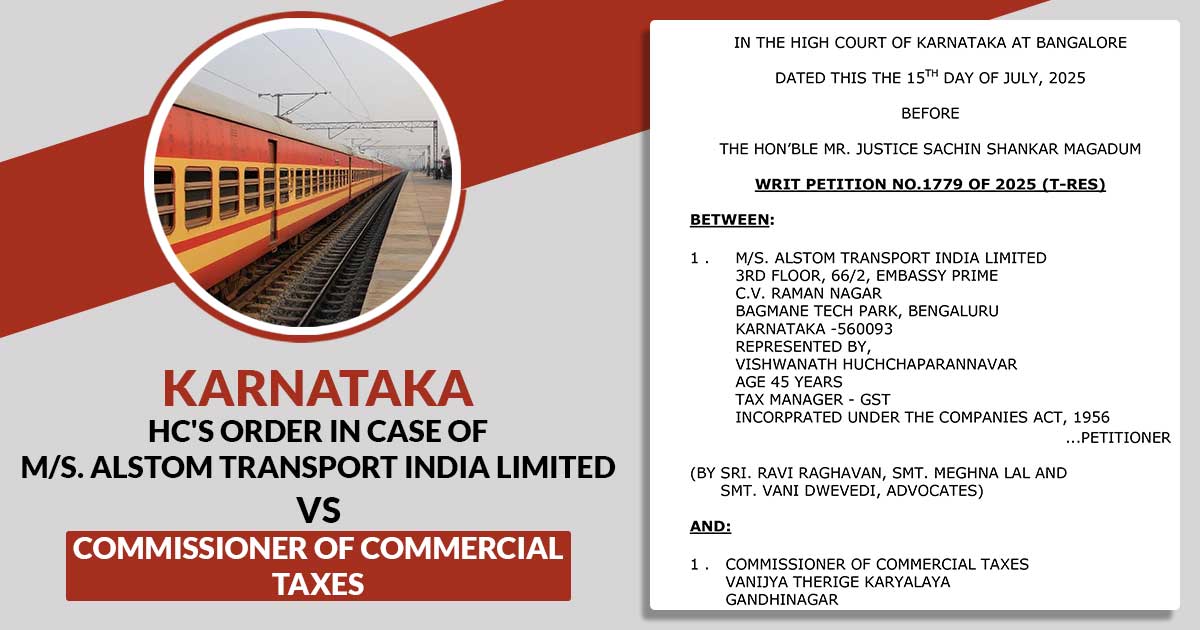
The Karnataka High Court has decided that IGST will not apply to arrangements where employees are temporarily assigned to work for foreign companies.
The issue of whether a secondment constitutes a taxable supply of manpower services or a non-taxable employer-employee relationship, which is covered under Schedule III of the CGST Act, was addressed by Justice Sachin Shankar Magadum.
Read Also: Essential GST Terms Every Business Taxpayer Should Know
The taxpayer, during the period from July 2017 to March 2023, avers that employees of its overseas group companies were seconded to work in India for a specified tenure.
These expatriates in the duration of their secondment were placed on the payroll of the applicant in India, and their salaries were paid via the taxpayer after deducting applicable Tax Deducted at Source (TDS) following the provisions of the Income Tax Act, 1961.
The department has issued an SCN asking to demand IGST for the period July 2017 to March 2023. The demand is based on the allegation that the taxpayer must file IGST on the import of ‘Manpower Supply Service’ from its overseas affiliates.
The taxpayer in reply has relied on Circular No.210/4/2024-GST dated 26.06.2024 issued by the Central Board of Indirect Taxes and Customs (CBIC), specifying that in cases of the related party transactions where full input tax credit is available to the reciver, the value declared in the invoice may be considered as the open market value under the second proviso to Rule 28 of the CGST Rules, 2017. The taxpayer claims that as no invoices were raised, the open market value is deemed to be ‘Nil’.
Even after providing the requisite documents, the Deputy Commissioner of Commercial Taxes/respondent no.3 issued a formal Show Cause Notice. Before the Karnataka High Court, the dissatisfied taxpayer has furnished a writ petition.
The taxpayer should file a response to the authorities, considering the then recently issued CBIC Circular on 26.06.2024, which clarified that in the absence of an invoice, the taxable value is deemed to be ‘Nil’.
The Assistant Commissioner of Commercial Taxes/respondent No.4, even after submitting the additional documents and explanations under the same clarification, passed the order validating the IGST demand on alleged import of manpower recruitment and supply services.
Taxpayer, under Rule 28 of the CGST Rules, 2017, salaries paid to expatriates cannot be treated as open market value. As these payments are categorised as salaries, they do not constitute consideration for the supply of manpower services and therefore do not attract IGST under reverse charge.
As per the department, under the Goods and Services Tax (GST) regime, the arrangement of the taxpayer with its overseas group entities is directed to the taxable supply of services. As per the department, the secondment of employees by the foreign parent or affiliated entities to the taxpayer comprises a provision of “manpower supply service”.
Paragraph 3.7 of Circular No. 210/4/2024-GST dated 26.06.2024 has been analysed by the bench and said that after the clarification in Para 3.7, the value of such services must be deemed to be ‘Nil’ and treated as the open market value. Even if arguendo such a secondment arrangement is presumed to be a supply, the consideration fiction as per the Circular offsets any scope for further tax liability.
The bench referred to the case of Metal One Corporation India Pvt. Ltd. v. Union of India & Ors., [2024 DHC 8298 DB] Delhi HC and cited that “………..This Court is in agreement with the view of the Delhi High Court that the Circular, being binding on the authorities, leaves little room for the Revenue to allege a taxable value in the absence of an invoice. Further, the second proviso to Rule 28 cannot be invoked to displace the legal effect of a ‘Nil’ value where the legislative framework itself permits such a deeming fiction, especially when full input tax credit is available.”
The bench, under the statutory exclusion under Schedule III and the clarificatory Circular issued via the CBIC, ruled that the secondment arrangement does not lead to any tax liability, and the revenue demand is to be set aside.
The bench in the above has permitted the petition.
| Case Title | M/S. Alstom Transport India Limited vs. Commissioner of Commercial Taxes |
| Case No. | WRIT PETITION NO.1779 OF 2025 (T-RES) |
| For Petitioner | Sri. Ravi Raghavan, Smt. Meghna Lal And Smt. Vani Dwevedi, Advocates |
| For Respondent | SMT. Jyoti M. Maradi, HCGP |
| Karnataka High Court | Read Order |








